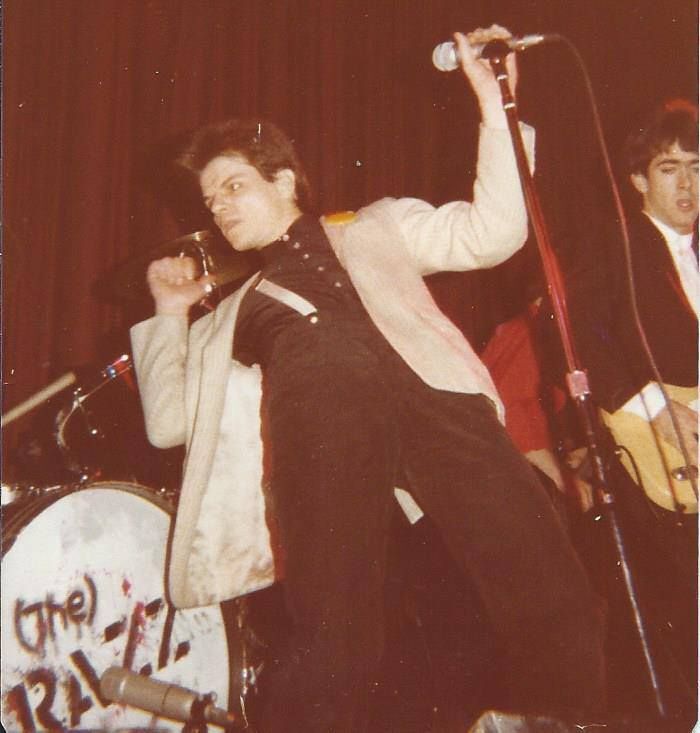Any fan of D.C.’s 1980s punk and new wave music scene has likely heard of Razz — the explosive and original band destined to be the next big thing.
Yet, many of those entertained and fascinated by Razz — including me — never got the chance to see them, between their start in 1971 and breakup in late 1979.
Spoiler alert: The D.C.-area band regarded by many as most-likely to reach rock stardom, didn’t.
Yet, Razz’s impact continues to fuel interest about the band that became an area phenomenon, amid a club scene dominated by cover bands and a record industry that found them impossible to label.
Saturday, filmmakers Jeff Krulik and Richard Taylor will screen an extended director’s cut of “Razz (The) Documentary,” at AFI Silver Theatre and Cultural Center in Silver Spring, Maryland.
“When you saw Razz at a small place, like The Keg (in Georgetown), or Childe Harold (in Dupont Circle) or the Psychedelly (in Bethesda), the experience was ‘this is incredible — this is national talent in a small room,” Taylor told WTOP.
Krulik agrees: “When you saw them, it was a long-lasting impression, which is why there’s still a fan base today.”
At the center of Razz — sometimes called (The) Razz — was singer Michael Reidy, the whirling dervish frontman, who once cut open drummer Doug Tull’s bass drum head and climbed inside, during a live performance.

Guitarist Bill Craig and bassist Ted Nicely anchored Razz. Still-rocking guitarist Abaad Behram and the late Tommy Keene flourished after Razz.
Razz’s music predated D.C.’s still-to-be-hatched hardcore punk scene, yet they were connected to the younger Georgetown Punks. Skip Groff, owner of Yesterday & Today Records produced records by Razz, along with early efforts from teen punks Teen Idles and Minor Threat.
“One of the things punk music did was ‘Do It Yourself’ — put out your own records, write your own original material, and Razz certainly was a part of that,” said Taylor. “But they were much more of a rock ’n’ roll band, kind of a garage, kind of Stones-y rock ’n’ roll band.”
The making of the movie
Creating a documentary film of a band whose heyday was in the 1970s is very different than it would be for a band poised to break big in 2023.
“There was a time when people didn’t have easy access to recording devices in their back pocket,” said Krulik, whose other film credits include cult classic “Heavy Metal Parking Lot,” “Led Zeppelin Played Here,” and “We Are Fugazi from Washington, DC.”
“There’s live recordings, there’s fan cassette recordings, there’s certainly photographs, but there’s really limited, little-to-no live performance footage,” said Krulik.
Krulik and Taylor have been researching and doing interviews for the Razz documentary for more than five years.
“People are going to be surprised by some of the stuff we have,” teased Taylor. “Stuff which has never been seen before.”
The film’s oral history will paint pictures, to supplement the footage.
“We interviewed Skip Groff, before he passed away,” in 2019, said Taylor. “We’ve interviewed all the members of Razz, multiple times, by themselves and in groups.”
The film also includes recollections from journalists for Unicorn Times and the Washington Post, who covered the band in the 1970s.
Krulik and Taylor thanked “Punk The Capital” filmmakers James June Schneider and Paul Bishow, who shared outtakes for the Razz project. “They were very generous with the material they gathered for that film.”
Why didn’t Razz become rock stars? “I think part of it’s luck, and part of it’s timing,” offered Taylor.
It wasn’t for lack of trying and dedication, said Krulik.
“They started in the early 70s — that’s almost a decade of effort and work, toward, — quote — ‘making it, in the music industry,'” said Krulik. “People run out of steam — that’s just a fact.”
Tickets are available for “Razz (The) Documentary,” directors’ cut, showing Saturday, April 29, at 5:30 p.m. Krulik, Taylor, and members of Razz will take part in a post-screening question-and-answer session.






